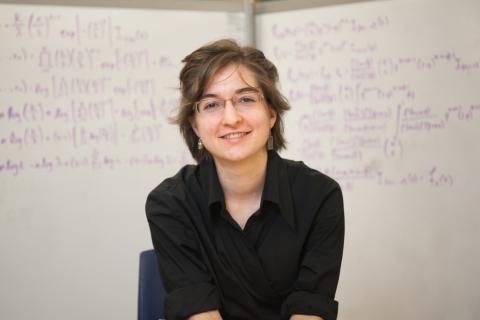
By Gavin Colton
Corrine Elliott began researching at the University of Kentucky while she was still in high school through Paul Laurence Dunbar's Math, Science, and Technology Center magnet program. She became one of the earliest members of the Odom Research Group, an organic chemistry laboratory specializing in energy storage.
Corrine earned a B.S. in mathematics in 2017 and, through the University Scholars Program, a master’s degree in statistics in 2018. During her tenure at UK, she also performed research in bioinformatics with professors Jinze Liu and Joseph Chappell and in model selection with the statistics department's Applied Statistics Lab.
In 2015, Corrine was awarded a summer undergraduate research grant, funded by the UK Women and Philanthropy Network, to pursue her work in organic synthesis—synthesizing chemicals for use in lithium-ion batteries.
Corrine received a second such award in 2016 to support a new direction in her research: computational modeling to predict which compounds were best suited to energy-storage applications.
“The undergraduate summer research and creativity fellowships helped support my transition from synthesis to computational chemistry, which took better advantage of my background in mathematics and statistics,” says Corrine.
Corrine built upon her work from those summers to accumulate three patents and 13 chemistry publications while at UK, including her first as primary author. On the strength of this research record, Corrine received two highly prestigious and nationally competitive awards, the Astronaut Scholarship and Barry Goldwater Scholarships, which are granted to students who demonstrate initiative, creativity, excellence and the commitment and potential to make a significant contribution in a chosen field. The American Chemical Society’s division of organic chemistry, meanwhile, recognized Corrine as her year's “most outstanding [undergraduate] senior” in organic chemistry.
Chad Risko, associate professor of chemistry at UK, served as one of Corrine’s advisors in tandem with Odom.
“The philanthropic funding provided for the summer research experience enabled Corrine to spend the time necessary to not only learn specific techniques associated with the field but also to make important connections between the molecules that she made and tested in the laboratory with knowledge that could be gained from modeling,” says Risko. “The ability to undertake such a multidisciplinary study empowered Corrine to push forward her scientific discoveries and really increase the impact of her research.”
Both grants gave Corrine the opportunity to continue working with the Odom Research Group (led by the late professor, Susan Odom) and develop her skills as a budding researcher. She appreciated Odom’s guidance during those summer months, which led her to explore other academic avenues that suited her interests and passions.
“Dr. Odom was a fabulous mentor,” says Corrine. “She knew that while I was interested in chemistry and battery applications, my strengths lay more in math and statistics and she encouraged me to find that niche of computational chemistry, which combined those skills.”
Corrine admits she didn’t always know she wanted to pursue a career in math and statistics and their application to the natural sciences. Her trajectory was defined by opportunities she encountered, and the values she learned from her father, D. Stephen Voss, a professor of political science methodology at UK, and her mother, Kathleen Elliot, who teaches high school English literature. From them, Corrine gained an appreciation for communication that enables people to benefit from academic learning.
For her, statistics had all the logic of mathematics but also an emphasis on improving the world.
“Math is great,” says Corrine, “but we need to do something tangible with it.” This theory led her to take a gap year to work for Berry Consultants, a Texas-based company that specializes in designing adaptive clinical trials to aid in medical device and drug development.
After gaining some industry experience, Corrine moved to California to pursue a doctorate at the University of California, Berkeley. She will enter her fourth year this fall and begin work on her dissertation. “I’m buckling down on research and figuring out what meaningful contribution I can make to statistical knowledge,” says Corrine.
A ruling philosophy had guided Corrine’s academic path from her early days in Dr. Odom’s lab to her summers spent researching organic synthesis. It’s one she hopes to sustain throughout her career. “All of my research involves using math and computers to gain a deeper understanding of the mechanisms that regulate the natural world.”
At various times, that’s meant modeling compounds to understand how molecules behave in chemical systems, examining how kingdoms of species share the same biological foundations or studying how we can learn about drugs to treat diseases.
“It’s about improving how the world. It’s about making a clear, immediate and lasting impact.”
